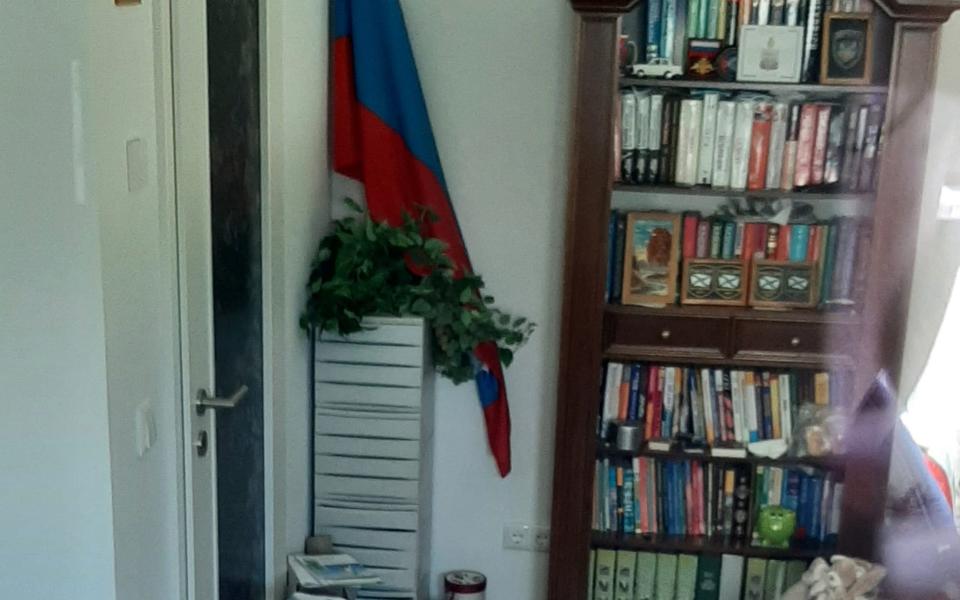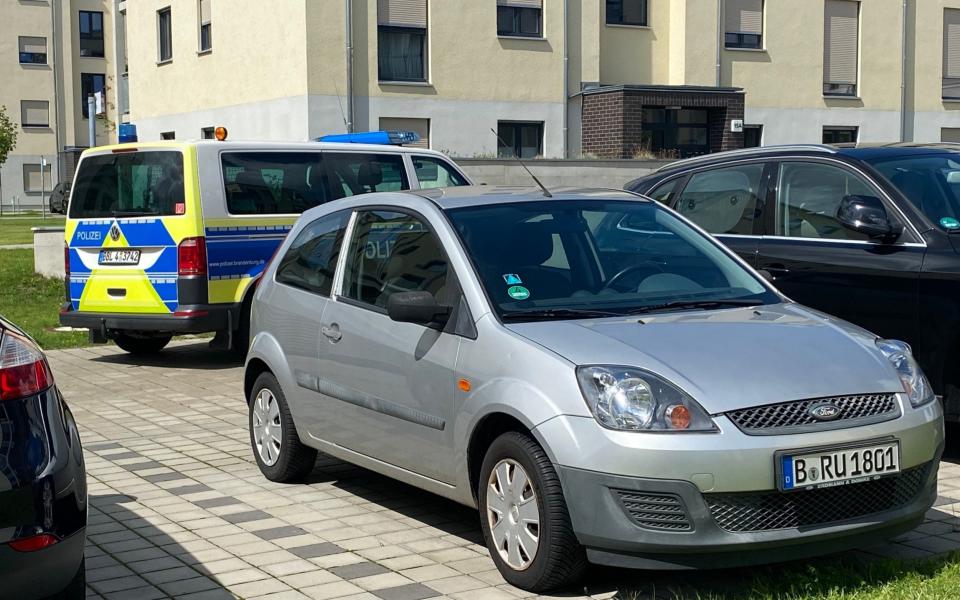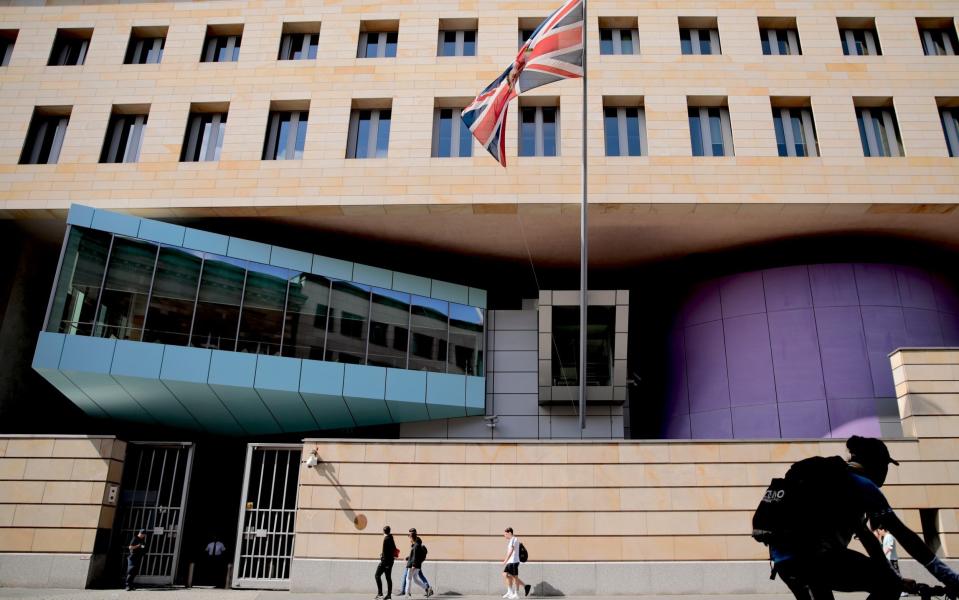Alleged Berlin spy is a former Royal Air Force airman

A British security guard accused of spying for Moscow is an ex-Royal Air Force airman who kept a giant Russian flag on display at his home, The Telegraph can disclose.
Ministers were under pressure on Thursday night to explain how David Smith, 57, was given a job at the British Embassy in Berlin despite keeping a collection of Soviet memorabilia in plain sight along with objects linked to Moscow-backed rebels in Ukraine.
Smith was arrested at his home in Potsdam after a months-long investigation led by MI5 and the German security services. A picture obtained by The Telegraph shows the British national being handcuffed and led into an unmarked van by plain clothes police on Tuesday afternoon.
A defence source confirmed to The Telegraph that Smith was a former junior airman with the RAF. It is understood he stopped serving with the Air Force some years ago.
According to Whitehall officials, he is believed to have offered the Russians a list of persons entering and exiting the embassy. The information is thought to have been low risk because British agents use aliases when signing in to embassies.
However, on Thursday night senior Conservative MPs questioned whether Smith, who was hired by a private contractor to guard the embassy, had been properly vetted by the Foreign Office and security services before taking up the role.
Pictures taken at his small flat revealed that a giant Russian flag was in plain sight through his front window, as well as a collection of Soviet military caps.
His shelves were laden with volumes of military history, while a small communist East German flag was on the mantelpiece. A Russian naval shield lay on the desk, while a toy dog wore the green hat of the Russian Border Guards Service.
Books included a biography of high-ranking Nazi Reinhard Heydrich, a novel by master spy writer John Le Carre, and a three-volume set by the former Russian culture minister Vladimir Medinsky in which he aimed to dispel "myths about Russia".

Foreign Office sources stressed that all private contractors working at British embassies are subject to strict checks.
But Sir Iain Duncan Smith, a former Tory leader, said: "There are clearly questions to be asked over whether the early vetting turned up anything and if not, why not. The vetting is clearly not up to scratch.
"He's no Kim Philby. If the vetting process can't pick him up and he's low level, are they going to be able to pick up people who are deeper problems to us and on a serious scale?"
Bob Seely, Tory vice-chairman of the all-party parliamentary group on Russia, said it was "concerning" that security concerns had not been flagged during the vetting process given the "eccentric" contents identified at Smith's home.
Other items on display at the flat included several scribbled notes on a desk which appeared to be relevant to the investigation. One of them read: "Berlin police have four numbers," while another said: "Docs for meeting at the weekend."
On Thursday night, security experts suggested the planned "meeting" could have been a sting set up by Western security services and used as the trigger for his arrest.
Smith kept other memorabilia linked to the Russian annexation of the Crimean peninsula in 2014, and the subsequent war in Ukraine.
Astack of letters from Dnipro, a city on the frontline of the conflict, could be seen through the window of his flat as well as a coffee mug with the emblem of Novorossiya, a separatist Russian puppet state in eastern Ukraine.
He also displayed a framed insignia of the notorious Berkut riot police, involved in violent crackdowns on pro-Western protesters in Ukraine in 2014.
Other memorabilia included the insignia of various Russian military units, among them the Pacific, Black Sea, Baltic and Northern fleets. Many Russian nationalists have viewed the war in eastern Ukraine, which is largely Russian-speaking, as the ultimate battle between Moscow and the West over what they believe is Russian land.
Smith's silver Ford Fiesta was still parked outside, with another teddy bear on the passenger seat and a Czech motorway toll sticker in the windscreen. German tabloid Bild joked that the vehicle was very different to the more glamorous Aston Martin sports cars favoured by the fictional spy James Bond.

Smith reportedly moved to Potsdam four years ago. Neighbours said they barely knew him, adding that he left home for work each morning at 6am and returned late at night.
One said: "He was friendly, smiley and a polite guy," while another added: "He always greets his neighbours. He's that type of person." They spoke of a woman who used to live with him, but none of them had seen her recently.
Smith has been charged under German law with "activity as an agent for a foreign secret service" and remanded in custody. He is unlikely to be extradited to the UK, it is understood.
Andrei Soldatov, a leading expert on Russian intelligence, said Smith was likely to be accused in court of being a "walk-in" agent because Russian intelligence has largely been relying on people offering information rather than cultivating its own sources.
"I doubt that this was an agent they have been cultivating like Kim Philby. Things that were possible in the 1930s don't exist any more," he told The Telegraph. "The job of Russian intelligence staff at embassies abroad has mostly been about sitting and waiting for those people to show up."
Mr Soldatov also said it is likely that the suspected agent fell victim to a sting operation by British intelligence, which has recently favoured this method of exposing foreign spies.
"There are always things to sell," he said. "If you're a security guard, for example, you would know the layout of the embassy, how things work there, including where the rubbish containers are. Even that would be very useful."

Dame Cressida Dick, the Metropolitan Police Commissioner, said detectives had been working on the case with the Germans for "a number of months".
"We will continue to work closely with them and through the next steps. If this person is charged we will support any trial, wherever that may be," she told LBC. "At the moment, the Germans are most certainly handling it."
She added: "These things are thankfully very rare."
Lord Ricketts, a former national security adviser, said the suspect was unlikely to have had access to highly classified information. However, he added that the case served as a reminder that the Russians continued to deploy traditional espionage methods to prise secrets from their rivals.
"We all think now about the Russians stealing secrets by hacking and providing disinformation by social media and so on – it is a reminder that the Russians haven't given up also on the old-fashioned ways of suborning individuals through money," he told the BBC.
"I think the Russian intelligence threat to all our countries has grown again. It probably dipped at the end of the Cold War but it is absolutely back in all our countries and so vigilance is essential, not only in these new areas but also in the old-fashioned areas of good physical security around embassies and ensuring loyalty in staff."
A spokesman for the Foreign Office refused to comment.

 Yahoo News
Yahoo News 
